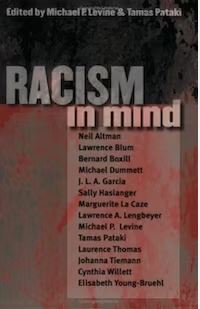Racism in Mind
Cornell University Press, US$22.50pb, 313pp
Hydra's Head
The anthropologists of some future galactic civilisation, sifting through the remains of human life on earth, will find much to puzzle them, but nothing more so than the propensity of supposedly rational creatures to denigrate, hate or even murder those who are perceived to be different in race. How should we understand racism? Where does it come from, and how can it be eradicated? The editors of this book have assembled an impressive collection of philosophers and psychologists to tackle these questions. Their wide-ranging and often conflicting answers do not make racism less puzzling, but, like all good philosophical investigations, this book has the effect of making the reader puzzle more profoundly.
The editors took a lot of pains with this collection. They ensured that it would be accessible to general readers, as well as scholars. The introduction, by Tamas Pataki, is particularly helpful in providing a framework for the discussion. The editors encouraged contributors to read and comment on each other’s work. The result is a discourse in which participants with different approaches and perspectives cooperate to tackle a matter of serious concern.
The first item on the agenda is the conceptual question, what is racism? Michael Dummett finds the answer ready to hand. Racism, he says, is prejudice against a racial group that manifests itself in hostile behaviour. Others do not think that his definition goes deep enough or encompasses everything that counts as racism. J.L.A. Garcia sees racism as a moral vice, an indifference to the feelings and well-being of people of a different racial group. A person can be a racist even if he or she never behaves in a hostile way toward people of other races. Michael Levine thinks that hatred and hostility are symptoms of deeper psychological states and that by identifying the cause we will understand what racism really is. Sally Haslanger thinks that an adequate understanding of racism has to encompass social institutions and practices that impose disproportionate burdens on members of particular racial groups. A history of injustice can put people into a position where they are more likely to be put into prison or have their children taken away even when institutional rules are being impartially administered by people who do not have racist attitudes.
Continue reading for only $10 per month. Subscribe and gain full access to Australian Book Review. Already a subscriber? Sign in. If you need assistance, feel free to contact us.












Leave a comment
If you are an ABR subscriber, you will need to sign in to post a comment.
If you have forgotten your sign in details, or if you receive an error message when trying to submit your comment, please email your comment (and the name of the article to which it relates) to ABR Comments. We will review your comment and, subject to approval, we will post it under your name.
Please note that all comments must be approved by ABR and comply with our Terms & Conditions.